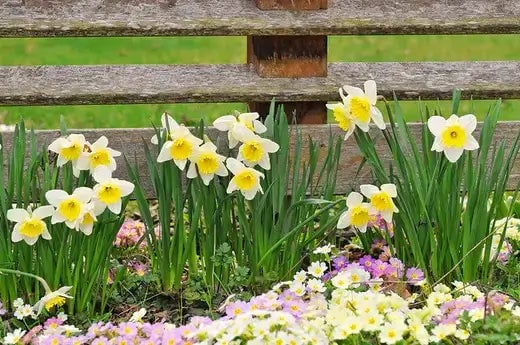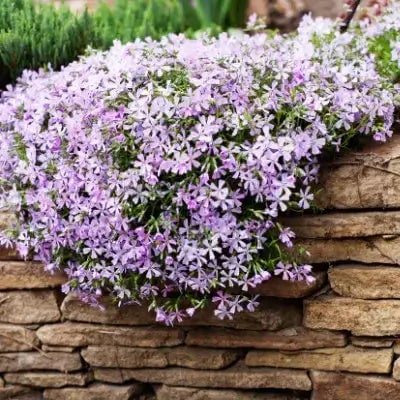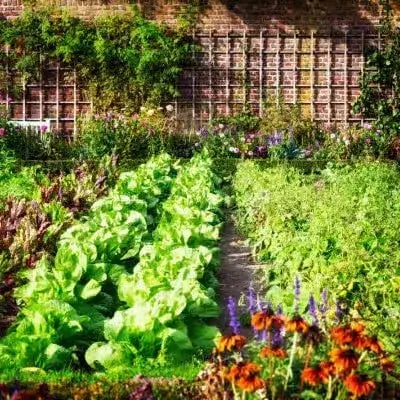10 Best Natural Gardening Tips for Beginners
Natural gardening, also known as organic gardening, is a practice that revolves around cultivating plants without the use of synthetic pesticides. It emphasizes harmonizing with nature to create a sustainable and healthy garden environment. Natural gardening might seem daunting for beginners. Still, it's a rewarding and fulfilling journey that connects you with the natural world's rhythms. This article will explore the ten best natural gardening tips to help beginners start on their path to a thriving and eco-friendly garden.
Choose the Right Location: The correct location for your garden is essential. Choose a spot that receives sunlight and good drainage. Consider the shade patterns, wind direction, and proximity to water sources. A well-chosen location sets the foundation for a successful natural garden.
Start with Healthy Soil: Healthy soil is the cornerstone of any successful garden. Focus on building and maintaining your soil's fertility through natural means. Incorporate compost, well-rotted manure, and other organic matter to improve soil structure, moisture retention, and nutrient content. Healthy soil supports robust plant growth and enhances the overall ecosystem.
Use Native Plants: Native plants require less water and maintenance than non-native species. By choosing native plants, you'll create a habitat that supports local wildlife and helps maintain the ecological balance.
Practice Companion Planting: Companion planting involves strategically placing different plants together to benefit each other. For instance, planting marigolds near tomatoes can deter pests, while beans can enrich the soil with nitrogen. Research companion planting combinations that work well for the plants you want to grow.
Embrace Biodiversity: A diverse garden is more resilient to pests and diseases. Plant various crops and flowers to attract multiple beneficial insects and pollinators. It helps maintain a balanced ecosystem and reduces the need for chemical interventions.
Mulching Matters:
Mulching serves multiple purposes in a natural garden. It helps retain moisture, suppresses weeds, and regulates soil temperature. Use organic materials like straw, leaves, or wood chips for effective mulching. Water Wisely: Efficient watering is crucial for natural gardening. Water deeply but less frequently to encourage profound root growth. Consider using soaker hoses to minimize water wastage. Collect rainwater in barrels to provide your plants with a natural water source.
Encourage Beneficial Insects For Your Natural Garden
Plant flowers that provide pollen to create habitats for these insects. Avoid using synthetic pesticides, which can harm these helpful creatures.
Compost Regularly: Composting kitchen scraps and garden waste reduces landfill waste and creates nutrient-rich compost for your garden.
Practice Patience and Observation: Natural gardening requires observation and patience. Monitor your garden regularly for nutrient deficiencies. By being proactive, you can address issues before they become significant problems. Also, understand that natural processes take time, so be patient and allow your garden to develop at its own pace.
Conclusion
Embarking on a journey of natural gardening as a beginner might seem daunting, but it's a step toward a more sustainable and harmonious way of cultivating plants. These ten best natural gardening tips create a thriving garden and contribute positively to the environment. Remember that natural gardening is about working with nature, nurturing the soil, and fostering biodiversity. As you gain experience, you'll develop a deeper understanding of the interconnectedness of all living things in your garden ecosystem. So, roll up your sleeves, dig in the soil, and enjoy the beauty and rewards of your natural garden.
In a world marked by urbanization, pollution, and environmental degradation, natural gardening has emerged as a beacon of hope for reconnecting with nature and nurturing a healthier planet. The conclusion encapsulates the essence of the wild gardening journey, drawing from the plethora of tips and insights shared earlier, and highlights its significance for individuals, communities, and the Earth.
1. Nurturing Biodiversity:
The emphasis on biodiversity is central to the concept of natural gardening. By cultivating multiple plants, flowers, and herbs, gardeners can create a balanced ecosystem supporting various life forms, from pollinators to beneficial insects. This approach not only enriches the garden's aesthetics but also contributes to the overall health of the local environment.
2. Soil Health: Natural gardening uses compost, mulch, and cover crops to enhance soil fertility, structure, and moisture retention. By avoiding synthetic fertilizers and pesticides, gardeners can promote the growth of beneficial microorganisms that support plant growth and improve the long-term sustainability of the garden.
3. Water Conservation:
Adopting water-efficient practices is crucial in a world where water scarcity is becoming increasingly prevalent. They conserve precious resources and minimize runoff and soil erosion.
4. Chemical-Free Approach:
One of the cornerstones of natural gardening is the avoidance of synthetic chemicals. By opting for natural alternatives like neem oil, garlic spray, and companion planting, gardeners can effectively manage pests and diseases without harming beneficial insects or contaminating the environment.
5. Permaculture Principles:
Permaculture, a design approach rooted in sustainable agriculture, offers valuable insights into natural gardening. Principles such as observing and interacting with nature, capturing and storing energy, and integrating rather than segregating elements can guide gardeners in creating self-sustaining and harmonious landscapes.
6. Mindful Garden Design:
A successful natural garden is a collection of plants and a thoughtfully designed space mimicking natural ecosystems. Features like wildlife habitats, bird feeders, and butterfly gardens can attract diverse creatures and foster a sense of unity with nature. Moreover, the layout and arrangement of plants can optimize sunlight, wind flow, and water distribution.
7. Education and Community Engagement:
Natural gardening extends beyond individual plots; it has the potential to cultivate a sense of community and environmental consciousness. Workshops, garden tours, and shared spaces can unite people to exchange knowledge and experiences. By involving younger generations, we can ensure the continuity of these practices and inspire a greater appreciation for the natural world.
8. Healing and Well-being:
Beyond its environmental benefits, natural gardening offers a range of therapeutic and well-being advantages. As such, natural gardens can serve as sanctuaries for mental and emotional rejuvenation.
9. Ethical Consumption:
Embracing natural gardening reflects a broader shift towards conscious and ethical consumption. By growing one's food, reducing waste, and minimizing the carbon footprint associated with conventional agriculture, individuals can actively contribute to a more sustainable food system and lessen the impact on the planet.
10. A Call to Action:
As the challenges of climate change loom, the practice of natural gardening emerges as a practical and empowering response. Each step towards nurturing a natural garden heals the Earth and rekindles our relationship. By embracing these principles, we enhance the beauty of our surroundings and contribute to future generations' well-being.
Natural gardening is more than a set of techniques;
It's a philosophy that fosters a deep connection with nature. The journey of tending to a garden teaches us patience, resilience, and the importance of coexisting with the natural world. It's a testament to our capacity to positively impact and create a harmonious coexistence between humans, plants, and animals.
As we conclude this exploration of natural gardening tips, let us remember that every seed sown, every bee attracted, and every smile exchanged over a blooming garden is a small yet significant contribution to the greater goal of sustainable living and a healthier planet for all.
The Best Beginner Plants for New Gardeners
Establishing a garden can be exciting yet daunting when you lack knowledge about the easiest plants to cultivate. Many beginner-friendly plants require minimal maintenance and ensure dependable growth while offering excellent opportunities to learn fundamental gardening techniques. These plant selections, including hardy annual flowers, versatile herbs, and dependable houseplants, will build your gardening confidence and expand your green thumb abilities. Explore beginner-friendly plant options for novice gardeners and discover essential tips to promote healthy growth under your care.
1. Marigolds
Marigolds offer vibrant flowers and natural pest control while remaining simple to grow. These plants exhibit warm-toned colors such as yellows, oranges, and reds, which add lively bursts of color to any garden space. These annual flowers can grow in various soil types while tolerating full sun and needing moderate water. The strong scent of these plants repels specific insects, making them valuable companions for growing tomatoes and peppers. To achieve optimal flowering results, maintain evenly moist soil regularly without waterlogging and deadhead spent blooms.
2. Zinnias
Beginners often choose zinnias because they produce stunning flowers while needing minimal care. Zinnias bring colorful and diverse flowers to garden beds and borders through their range of sizes, from tiny dwarf plants to large blossoms that resemble dahlias. Zinnias grow best when they receive full sunlight exposure with soil that drains effectively. To prevent mildew, you should water zinnias at the soil level instead of using overhead watering, which can wet their foliage. Zinnias achieve a more extended flowering season through deadheading, similar to marigolds. The simple act of planting zinnias in a small garden area both draws butterflies and adds color throughout summer.
3. Basil
The culinary herb basil appeals to many beginners because it exhibits fast growth and enables multiple harvests. The flavorful basil leaves are a perfect addition to pasta dishes while improving salads and soups, leading to its popularity in home gardens. Basil plants require warm temperatures and six hours of daily sunlight while needing consistent watering. Regularly prune basil by removing flower buds when they emerge and harvesting leaves often to stimulate leafy growth. Gardeners new to herb cultivation can start with basil, which grows well in pots and garden beds.
4. Mint
Mint is the ideal herb for gardeners seeking an option that is more effortless to cultivate than basil. Mint demonstrates strong growth and produces aromatic leaves, making it very easy to develop, but its invasive nature requires careful control. Growing mint in containers or pots will protect your garden from invasive growth tendencies. Mint grows well in partial shade and full sun conditions, requiring consistently moist soil to thrive. You can use mint leaves to brew refreshing teas or to enhance desserts and savory dishes with their flavor. The abundant growth of mint plants ensures ample leaves for culinary experimentation in your kitchen.
5. Lettuce and Leafy Greens
Growing lettuce, spinach, and arugula produce quick results because these leafy greens require minimal care. Depending on local weather conditions, cool-season crops should be planted in either spring or fall, and they usually reach maturity within a few weeks. The shallow root systems of these plants make them ideal for growth in pots and window boxes. Ensure the soil retains moisture while providing your plants partial to full sunlight. Pluck the external growth of leaves as they develop to enable your plants to keep producing fresh greens. The "cut-and-come-again" method ensures a constant flow of ingredients for your salad.
6. Radishes
Radishes quickly develop into mature vegetables since they can be harvested in three to four weeks from planting. New gardeners who want quick results will find their rapid growth an excellent choice. Radishes require full sunlight and perform best in soil that drains well and remains loose. Successful radish cultivation requires steady moisture levels because dry conditions lead to woody texture and excessive spiciness. The brief growing season of radishes makes them perfect for succession planting, allowing gardeners to plant new seeds every few weeks for an endless harvest.
7. Snake Plant (Sansevieria) for Indoors
Lack of outdoor space means you cannot create a conventional garden, but it does not prevent you from growing indoor plants. The Snake Plant, also known as Mother-in-Law's Tongue, stands out as one of the easiest houseplants for indoor gardeners to maintain. The plant can survive in dim conditions but grows best under bright, indirect sunlight and requires minimal watering. The vertical leaves of this plant create an artistic impact in any space. The Snake Plant cleans indoor air by absorbing harmful toxins and producing oxygen throughout the night hours. They allow occasional watering mistakes while remaining ideal for people new to gardening.
8. Pothos
Another foolproof houseplant is Pothos (Epipremnum aureum). Pothos plants possess trailing vines and heart-shaped leaves that can thrive under various lighting conditions, from dim to bright indirect illumination. The plant needs watering only when the soil's topmost layer reaches dryness. Pothos plants can recover after being overwatered or ignored for some time. You can guide the cascading stems of this plant to grow up a trellis or let them cascade from a hanging basket to create a lush, tropical atmosphere indoors.
9. Spider Plant
Spider plants are an excellent choice for those who want a houseplant that reproduces quickly. Spider plants generate small growths called "plantlets" or "spiderettes" from arching leaves, which you can cut and root to form new plants. Spider Plants require bright indirect sunlight and watering when the soil's surface becomes dry. The ability of these plants to withstand low light conditions and occasional neglect makes them appropriate for beginner gardeners who need to develop their watering skills. Spider Plants serve as decorative additions to indoor spaces while actively cleaning the air.
Tips for Beginners
A set of fundamental tips exists that works for all plants and will guide you toward successful plant care.
Begin with a few dependable plants instead of attempting to cultivate every plant species simultaneously. The method enables you to become proficient in fundamental practices before broadening your scope.
Gardeners' most frequent errors involve incorrect watering practices, such as over- and under-watering. Monitor your soil moisture levels frequently and modify your watering routine when necessary.
Monitor the light exposure to confirm your plants receive sufficient sunlight. Monitor the sun's migration throughout the day to locate the ideal position for your outdoor garden.
Place your houseplants near different windows and monitor their growth reactions.
Quality soil produces healthy plants. Enriching your growing medium with compost when planting outdoors or indoors or selecting an appropriate potting mix.
Look for early indicators of pests or diseases in your plants. Quickly treating problems will prevent them from expanding into more significant issues.
By starting with simple plants that thrive outdoors and indoors, you will develop essential gardening skills while building confidence from their success. Successful gardening experiences motivate you to explore new plant varieties and test different gardening methods, which help broaden your gardening knowledge. Your garden will soon flourish, and you'll gain confidence to handle more demanding plant projects.
Read more

The size of fenced gardens does not limit their potential for imaginative planting arrangements and sustainable ecological designs. When gardeners plan carefully and choose appropriate plants, such...

Ground covers add beauty and usefulness to your yard or garden. Some use ground covers to help deal with erosion in their yards. Creeping Phlox is an excellent choice for homeowners. It is being cl...


